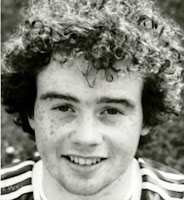WILLIAM HILL SPORTS BOOK OF THE YEAR 2016
Chasing Shadows: The Life and Death of Peter Roebuck.
by Tim Lane and Elliot Cartledge (Hardie Grant)Review by Jon Culley
 |
| Peter Roebuck: Journalist was being questioned by police |
According to witnesses, Roebuck, a brilliant writer and commentator but as an individual something of an enigma, was reportedly in good spirits. Waiting for him in the lobby of the hotel, however, were two police officers.
They were investigating an accusation of sexual assault made against Roebuck by a Zimbabwean man whom he had supposedly met at the same hotel a few days earlier.
The officers accompanied Roebuck to his sixth-floor room to talk to him about the allegation. During the course of the interview, the 55-year-old Cambridge-educated former Somerset captain fell to his death from a window. The officers said that he had committed suicide but many questions remain unanswered about what happened in the room and in the preceding days.
Australian journalists Tim Lane and Elliot Cartledge have attempted to fill in some of the gaps. Given that the real Roebuck was a mystery to many even close acquaintances, they have not done a bad job, although they still do not manage to penetrate far beneath the surface of his character.
Feud with Viv Richards and Ian Botham
 |
| Roebuck's stance over Viv Richards and Joel Garner caused a rift at Somerset |
Most interest, inevitably, will focus on the nature of Roebuck's private life and his work with disadvantaged young African men.
In 2001 he was convicted of common assault following allegations that he caned three such men who were living at his home in Taunton, after which he became increasingly estranged from the country of his birth. An Australian citizen, he subsequently divided his time between homes in Sydney and Pietermaritzburg, where he provided shelter and education for many of the young men, mostly Zimbabweans, who he set out to help.
Lane -- a colleague at ABC for many years -- and his co-author have assembled an impressive cast of character witnesses, including ex-cricketers Mike Atherton, Jonathan Agnew, Steve Waugh, Ian Chappell and Rahul Dravid, his broadcasting colleague Jim Maxwell, and the journalist Matthew Engel.
They reproduce, too, in graphic detail, the testimony of his Cape Town accuser, Gondo Itai, which was included somewhat controversially while the Roebuck family's lawyers were still pushing for an open inquest to take place, the only ruling at that time on cause of death having taken place in private.
An unlikely romance
 |
| Peter Roebuck in his playing days |
The only love of Roebuck's life, it seems, Julia met him in Sydney in 1981 when she was studying at the University of New South Wales. It took him two years to invite her to dinner, after which he returned to England to continue his career. They wrote to one another often, Roebuck apparently eager for the relationship to continue, explaining his wish to settle down.
For a while, when he was next in Australia, they blossomed as a couple. But complications were never far from the surface with Roebuck and after Horne made a return visit to England during the cricket season, the relationship ended. He had made a decision, for one reason or another, to withdraw into the closed world he occupied previously.
The book has not been immune to criticism. Some feel there is a lack of attention to cricket itself, to the way Roebuck played, to the players he admired and what that might have said about him, and also to his writing, the character of which is said to have changed the way the game was presented, particularly in Australia, making other writers feel more free to express themselves, and taking cricket journalism to a new level.
There is no arguing with the depth of the authors' research, however, and if fails ultimately to reach as deeply into Roebuck's psyche as they doubtless hoped they could, the book offers as much as anyone was able to unravel even among those closest to him.
Chasing Shadows: The The Life and Death of Peter Roebuck, by Tim Lane and Elliot Cartledge (Hardie Grant)
More reading:
And then there were seven - full details of the shortlist for the William Hill Sports Book of the Year 2016
William Hill Sports Book of the Year 2016: The full longlist
Home


